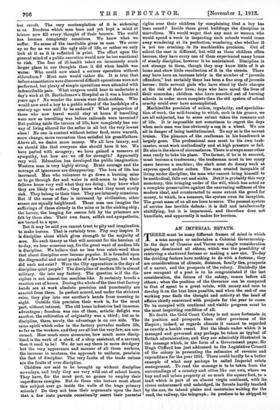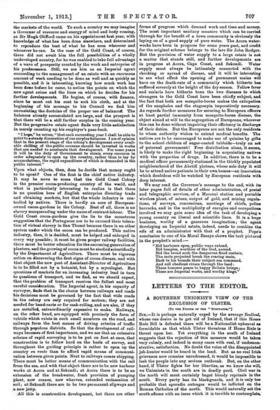AN IMPERIAL ESTATE.
THERE must be many different frames of mind in which a man accepts or undertakes a Colonial Governorship. In the days of Crassus and Verres one single consideration perhaps dominated all others, which was the possibility of retrieving a shattered fortune or making a new one. To-day the deciding factors have nothing to do with a fortune ; they are considerations of climate, distance, family ties, prospects of a career, and the prospects of the colony. Decidedly the new occupant of a post is to be congratulated if the last consideration, the future of the colony, comes before all others ; when the position of the Governor can be compared to that of agent to a great estate, with money and men to develop it on the best lines possible, and when the end of one working year finds the thought and activity at the head of affairs chiefly concerned with projects for the year to come. To be occupied with continual and visible progress must be the most inspiriting condition of all.
No doubt the Gold Coast Colony is not more fortunate in its position and prospects than other provinces of the Empire ; indeed, as regards climate it cannot be regarded as exactly a health resort. But the ideals under which it is managed and governed may perhaps be taken as typical of British administration, and they are admirably illustrated in the message which, in the form of a Government paper, Sir Hugh Clifford has just addressed to the Legislative Council of the colony in presenting the estimates of revenue and expenditure for the year 1914. There could hardly be a better example of what may perhaps be called Imperial estate management. To read the message is to be taken from the surroundings of a country and cities like our own, where we buy and sell urban property at so much the square foot, to a land which is part of an almost virgin continent, with its rivers unharnessed and unbridged, its forests hardly touched by the axe, its inland plains and mountains waiting for the road, the railway, the telegraph ; its produce to be shipped to
the markets of the world. To such a country we may imagine a Governor of resource and energy of mind and body coming, as Sir Hugh Olifford came on his appointment last year, with knowledge of what has been done elsewhere, and determined to reproduce the best of what he has seen wherever and whenever he can. In the case of the Gold Coast, of course, there did not await him the full possibilities of a -wholly undeveloped country, for he was enabled to take full advantage of a wave of prosperity created by the work and enterprise of his predecessors. Still, we see him as an Imperial agent succeeding to the management of an estate with an enormous amount of work needing to be done as well and as quickly as possible, and it is interesting, knowing how much work has been done before be came, to notice the points on which the new agent seizes and the lines on which he decides for his further developments. He begins, of course, with finance, since he must out his coat to suit his cloth, and at the beginning of his message to his Council we find him enunoiatiag the doctrine of the proper use of balancet. The balances already accumulated are large, and the prospect is that there will be a still further surplus in the coming year. But the progressive estate agent finds very little satisfaction in merely counting up his employer's pass-book.
"I hope," he writes, "that each succeeding year I shall be able to pointto a steady diminution of our surplus balances. I am of opinion that in the present stage of the colony's development every avail- able shilling of the public revenue should be invested in works that are needed to accelerate that development. For some years it will be the duty of Government to strain every resource in order adequately to open up the country, rather than to lay by accumulations, the rapid expenditure of which is demanded in the public interest."
Upon what objects, then, does he decide that money ought to be spent P One of the first is the chief native industry.
It may be news to some that the Gold Coast Colony is the premier cocoa-producing country of the world, and what is particularly interesting to realize is that there is no question here of English enterprise directing trade and obtaining markets, but that the whole industry is con- trolled by natives. There is hardly an acre of European- owned cocoa-gardens in the Colony. Best of all, there is no slavery masquerading under the name of contract labour. The Gold Coast cocoa-gardens give the lie to the monstrous suggestion that the Portuguese are to be excused their tolera- tion of virtual slavery in San Thome because there is no other system under which the cocoa can be produced. This native industry, then, it is decided, must be helped and enlarged in every way possible; it must be given proper railway facilities, there must be better education for the oncoming generation of planters, and the growing of cocoa must be studied scientifically by the Department of Agriculture. There must be vigorous action on discovering the first signs of cocoa-disease, and with that object the new post of Assistant-Director of Agriculture is to be filled not by a botanist, but by a mycologist. But questions of markets for an increasing industry lead in turn to questions of transport, and we find, as we should expect, that the problem of transport receives the fullest and most careful consideration. The Imperial agent, in his capacity of surveyor, finds that in the choice between railways and roads his decisions must be governed by the fact that wide roads in the colony are only required for motors; they are not needed for hand-carts or for cask-rolling, and are also, if they are metalled, extraordinarily expensive to make. Railways, on the other hand, are equipped with precisely the form of vehicle which exists in such small numbers on the road, and railways form the best means of driving arteries of traffic through populous districts. So that the development of rail- ways becomes of first importance, and we see that an extensive scheme of rapid surveying is to be put on foot at once, that construction is to follow hard on the heels of survey, and throughout the guiding principle is rather to open up the
country en. route than to afford rapid means of communi- cation between given points. Next to railways comes shipping. There must be better means of communication with the rail from the sea, and with that object there are to be new harbour works at Accra and at Sekondi; at Accra there is to be an extension of the breakwater, fresh provision of pumping
plant, new cranes, new wharves, extended reclamation of soil; at Sekondi there are to be two permanent slipways and • a new jetty.
All this is constructive development, but there are other forms of progress which demand work and time and money. The most important sanitary measure which can be carried through for the benefit of a town community is obviously the laying on of a good supply of pure water. The Accra water- works have been in progress for some years past, and credit for the original scheme belongs to the late Sir John Rodger. But the provision of water supply to a large estate is not a matter that stands still, and further developments are in progress at Accra, Cape Coast, and Sekondi. Water supply must always be intimately connected with the checking or spread of disease, and it will be interesting to see what effect the opening of permanent mains will have on the death-rate of a community which hitherto has suffered severely at the height of the dry season. Yellow fever and malaria have hitherto been the two diseases to which strangers to the Gold Coast have been chiefly subject, and the fact that both are mosquito-borne makes the extirpation of the anopheles and the stegomyia imperatively necessary.
As regards further measures for securing to European officers at least partial immunity from mosquito-borne disease, the object aimed at will be the segregation of Europeans, wherever
this can be done without impairing their efficiency in discharge of their duties. But the Europeans are not the only residents to whom authority wishes to extend medical benefits. The natives are to be encouraged to make use of quinine by gifts to the school children of sugar-coated tabloids—truly an act
of paternal government! Free distribution alone, it seems,
is likely to make the right beginning in acquainting natives with the properties of drugs. In addition, there is to be a
medical officer permanently stationed in the thickly populated neighbourhood of the Abetifi plateau, whose sole duty it will be to attend native patients in their own homes—an innovation which doubtless will be watched by European residents with deep interest.
We may read the Governor's message to the end, with its later pages full of details of other administration, of postal and telegraphic services, of a Marconi station and portable
wireless plant, of mines, output of gold, and mining regula- tions, of surveys, concessions, meetings of chiefs, police barracks, and in the multiplicity of energies and occupations involved we may gain some idea of the task of developing a young country on liberal and scientific lines. It is a huge business, worthy of a generous imagination; the agent developing an Imperial estate, indeed, needs to combine the rile of an administrator with that of a prophet. Pope's
conclusion to one of his Moral Essays shows the task pictured in the prophet's mind :—
" Bid harbours open, public ways extend, Bid temples, worthier of the God, ascend. Bid the broad arch the dangerous flood contain, The mole projected break the roaring main, Back to his bounds their subject sea command, And roll obedient rivers through the land These honours peace to happy Britain brings ; These are Imperial works, and worthy kings."































































 Previous page
Previous page